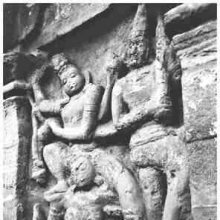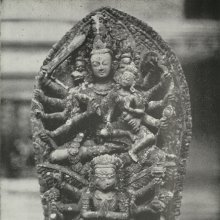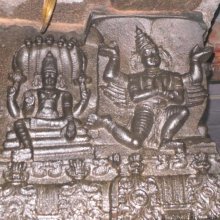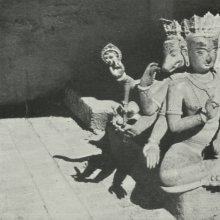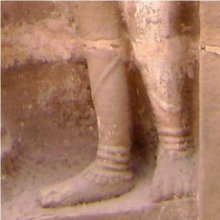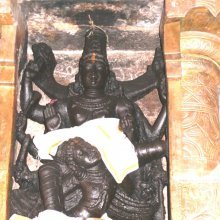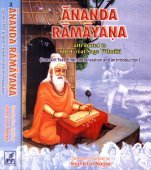Vaikuntha, Vaikuṇṭha, Vaikuṃṭha, Vaikuṇṭhā, Vaikumtha, Vaikumthapati: 30 definitions
Introduction:
Vaikuntha means something in Hinduism, Sanskrit, Marathi, Jainism, Prakrit, Hindi, biology. If you want to know the exact meaning, history, etymology or English translation of this term then check out the descriptions on this page. Add your comment or reference to a book if you want to contribute to this summary article.
Vaikuntha has 29 English definitions available.
Alternative spellings of this word include Vaikunth.
Images (photo gallery)
(+1 more images available)
Languages of India and abroad
Sanskrit dictionary
[Deutsch Wörterbuch]
Source: Cologne Digital Sanskrit Dictionaries: Böhtlingk and Roth Grosses Petersburger WörterbuchVaikuṇṭha (वैकुण्ठ):—(von vikuṇṭha)
1) adj. und m. Beiw. und Beiname Indra's [Hemacandra’s Anekārthasaṃgraha.3, 178.] [Medinīkoṣa ṭh. 16.] [ŚAT.] [BR. 14, 5, 1, 6] (= aprasahya Comm.). [Kauṣītakyupaniṣad 4, 2. 7.] —
2) m. ein N. Viṣṇu’s (Kṛṣṇa’s) [Amarakoṣa 1, 1, 1, 13.] [Hemacandra’s Abhidhānacintāmaṇi 215.] [Hemacandra’s Anekārthasaṃgraha] [Medinīkoṣa] [Halāyudha 1, 22.] [Mahābhārata 1, 2505. 3, 8755. 6, 301. 13, 6993.] [Harivaṃśa 12563.] [Gītagovinda 6] in der Unterschr. [Prabodhacandrodaja 81, 17.] [Bhāgavatapurāṇa 1, 15, 46. 8, 44. 2, 10, 4. 3, 14, 47. 15, 13. 14. 4, 12, 42. 13, 1. 20, 1. 8, 5, 4. 7, 31.] [WEBER, KṚṢṆAJ. 249. 294.] [PAÑCAR. 1, 5, 30. fg. 2, 2, 85. 4, 3, 36 (S. 249). 8, 38.] [PADMA-Pāṇini’s acht Bücher 2, 2.] eine Statue Viṣṇu’s [Rājataraṅgiṇī 6, 305. 8, 2435.] —
3) m. pl. Bez. einer Klasse von Göttern [Hemacandra’s Abhidhānacintāmaṇi 5.] [Bhāgavatapurāṇa 8, 5, 4.] [Mārkāṇḍeyapurāṇa 75, 71] (entweder pl. zu lesen oder gaṇa zu ergänzen). [Oxforder Handschriften 56,b,34.] —
4) m. n. Viṣṇu’s Himmel [Spr. (II) 1783.] [Bhāgavatapurāṇa 3, 16, 1] (vikuṇṭha ed. Bomb.). [8, 5, 5. 9, 4, 60.] [WILSON, Sel. Works I, 16. 123. 145. 149. 156. 166.] [Vopadeva’s Grammatik 26, 129.] [PAÑCAR. 2, 3, 62. 4, 8, 39.] [WEBER, KṚṢṆAJ. 222. 250.] gati [Pañcatantra 48,3.] [Oxforder Handschriften 13,b,48. 62,a,41. 250,b,32.] svarga [Pañcatantra ed. orn. 56, 21.] svarga [53, 14.] loka [Oxforder Handschriften.8,a,30.] bhuvana [248,a,22.fg.] —
5) m. Bez. des 24ten Tages im Monat Brahman's; s. u. kalpa (2 d). —
6) m. ein best. Tact; s. u. pratitāla 1). —
7) m. Nomen proprium des Verfassers eines Mantra im [Kāṭhaka-Recension] [Weber’s Indische Studien 3, 458.] eines Lehrers [HALL 7. 132.] purī [?205. Oxforder Handschriften 227,a, No. 557. WILSON, Sel. Works I,231.] śiṣyācārya [HALL. 135.] —
8) f. ā die Śakti Vaikuṇṭha’s (Viṣṇu’s) [PAÑCAR. 3, 2, 8.] — Vgl. nitya .
Sanskrit, also spelled संस्कृतम् (saṃskṛtam), is an ancient language of India commonly seen as the grandmother of the Indo-European language family (even English!). Closely allied with Prakrit and Pali, Sanskrit is more exhaustive in both grammar and terms and has the most extensive collection of literature in the world, greatly surpassing its sister-languages Greek and Latin.
See also (Relevant definitions)
Starts with (+19): Vaikumthapada, Vaikumthasamaradhane, Vaikumthayatre, Vaikuntam, Vaikuntan, Vaikuntanatan, Vaikuntha Ekadashi, Vaikuntha-perumal, Vaikunthabhavana, Vaikunthabhuvana, Vaikunthacaturdashi, Vaikunthachaturdashi, Vaikunthadhama, Vaikunthadikshita, Vaikunthadikshitiya, Vaikunthadipika, Vaikunthadipikanatha, Vaikunthadipikanathacarya, Vaikunthagadya, Vaikunthah.
Ends with: Bhuvaikuntha, Nityavaikuntha, Shrivaikuntha.
Full-text (+188): Vishnuloka, Vaikunthavasi, Vikuntha, Vaikunthiya, Svaratikrama, Vaikunthadikshitiya, Vaikunthatva, Vaikunthaloka, Vaikunth, Vaikunthacaturdashi, Narayana, Vaikuntha Perumali, Vaikunta, Vaikunthabhuvana, Vaikunthadipikanatha, Vaikuntavinnakaram, Vaikunthadipikanathacarya, Vaikunthavarnana, Vaikunthasvarga, Vaikumthasamaradhane.
Relevant text
Search found 82 books and stories containing Vaikuntha, Vaikuṃṭha, Vaikumtha, Vaikumthapati, Vaikuṃṭhapati, Vaikuṇṭha, Vaikuṇṭhā, Vaikunthapati, Vaikuṇṭhapati; (plurals include: Vaikunthas, Vaikuṃṭhas, Vaikumthas, Vaikumthapatis, Vaikuṃṭhapatis, Vaikuṇṭhas, Vaikuṇṭhās, Vaikunthapatis, Vaikuṇṭhapatis). You can also click to the full overview containing English textual excerpts. Below are direct links for the most relevant articles:
Garga Samhita (English) (by Danavir Goswami)
Verse 2.3.7 < [Chapter 3 - Description of the Yamunā’s Arrival]
Verse 4.7.25 < [Chapter 7 - The Story of the Ayodhya Women]
Verse 4.9.16 < [Chapter 9 - The Glories of Srī Ekādaśī]
Brihad Bhagavatamrita (commentary) (by Śrī Śrīmad Bhaktivedānta Nārāyana Gosvāmī Mahārāja)
Verse 2.4.10 < [Chapter 4 - Vaikuṇṭha (the spiritual world)]
Verse 2.3.130 < [Chapter 3 - Bhajana (loving service)]
Verse 2.3.137 < [Chapter 3 - Bhajana (loving service)]
Chaitanya's Life and Teachings (by Krishna-das Kaviraj)
Chapter XIX - On the sweetness of Krishna's attributes
Rig Veda (translation and commentary) (by H. H. Wilson)
Chaitanya Bhagavata (by Bhumipati Dāsa)
Verse 1.8.15 < [Chapter 8 - The Disappearance of Jagannātha Miśra]
Verse 1.1.10 < [Chapter 1 - Summary of Lord Gaura’s Pastimes]
Verse 3.3.263 < [Chapter 3 - Mahāprabhu’s Deliverance of Sarvabhauma, Exhibition of His Six-armed Form, and Journey to Bengal]
Bhajana-Rahasya (by Srila Bhaktivinoda Thakura Mahasaya)
Related products
